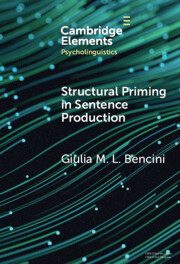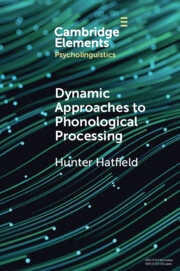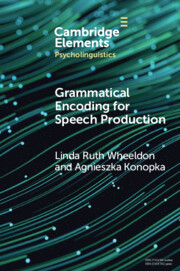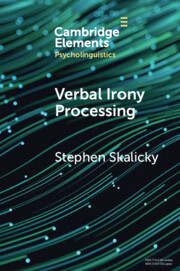About Cambridge Elements in Psycholinguistics
Psycholinguistics is a highly interdisciplinary field of research and teaching. It is of primary relevance within linguistics and psychology and is influenced by the research methodologies and teaching practices in both fields. Courses and research in psycholinguistics are also found in multidisciplinary cognitive science units throughout the world.
Basic research in psycholinguistics addresses fundamental questions such as the following:
- What kinds of mental representations do language users have for the elements of their language?
- How do speakers and writers access and assemble linguistic elements during production?
- How do listeners and readers retrieve linguistic information from the input during comprehension?
- How do speakers and listeners manage their interaction with one another?
- How does language processing relate to other areas of cognition and to the social contexts of language use?
Addressing these issues through theoretical and empirical studies, ranging across a number of linguistic levels (e.g., speech sounds, words and other meaningful elements, phrases and sentences), the series presents high quality and up-to-date scholarly works in a compact, accessible format.
Elements in this series
The series will cover topics including:
- Utterance and discourse planning
- Grammatical encoding
- Lexical selection and insertion
- Phonological encoding and articulation
- Monitoring and repair
- Speech and gesture
- Cross-linguistic research in language production
- Multilingualism and language production
- Language production and language impairment
- Spoken word recognition
- Visual word recognition
- Connectionist and statistical models of word recognition
- Morphological representations and processes
- Semantic and conceptual representations
- The multilingual lexicon
- Word recognition and language impairment
- Syntactic sentence parsing
- Semantics and interpretation
- Discourse level processing
- Prosodic structure and comprehension
- Cross-linguistic research in language comprehension
- Multilingualism and language comprehension
- Language comprehension and language impairment
- Observational and behavioural methodologies in psycholinguistics
- The role of eye movement research in psycholinguistics
- The use of event-related potentials (ERP) in psycholinguistics
- Neurophysiological approaches to psycholinguistic research
- Statistical approaches in psycholinguistics
- Memory and language processing
- Processing of spoken and signed languages
- Psycholinguistics and AI
- Cognitive linguistics and psycholinguistics
- Sociophonetics and psycholinguistics
- Developmental psycholinguistics
Elements in Psycholinguistics will be of interest to:
- Researchers and scholars in psycholinguistics seeking up-to-date summaries of current key topics
- Scholars in other fields of linguistic study who want to explore the relevance of psycholinguistic research to their own areas
- Graduate students wanting to extend their understanding of psycholinguistics or to access current research developments in the field
- Advanced undergraduate students hoping to explore the foundational and empirical bases of psycholinguistics
About the Editor
Paul Warren is Professor of Linguistics at Victoria University of Wellington, New Zealand, where his teaching and research is in psycholinguistics, phonetics, and laboratory phonology. His publications include Introducing Psycholinguistics (2012) and Uptalk: the phenomenon of rising intonation (2016), both published by CUP. He is a founding member of the Association for Laboratory Phonology, and a member of the Australasian Speech Science Technology Association and the International Phonetic Association. Paul is a member of the editorial boards for Laboratory Phonology and the Journal of the International Phonetic Association, and for 20 years (2000-2019) served on the editorial board of Language and Speech.
Contact the Editor
If you would like more information about this series, or are interested in writing an Element, email Paul Warren at: [email protected]
Editorial Board
Andrea Weber, University of Tübingen, Germany
Anna Piasecki, University of the West of England, UK
Mailce Borges Mota, University of Santa Catarina, Brazil
Shari Speer, The Ohio State University, USA
Yuki Hirose, University of Tokyo, Japan




